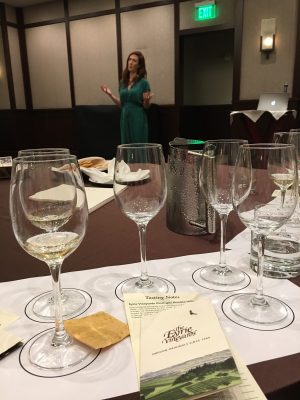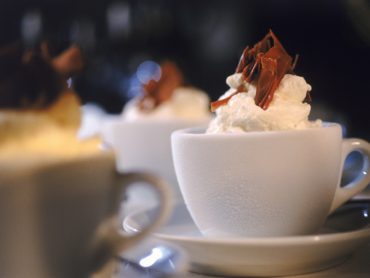In Vino Veritas LIX: The Indirect Value of Wine Tasting Events
 Away on vacation for a food and wine festival hosted by a luxury mountain resort, I was fortunate enough to participate in a wine tasting conducted by Amy McCandlish, assistant winemaker at Eyrie Vineyards in MicMinnville, Oregon. The one-hour-plus presentation provided a quick overview on the winery and included a tasting of five of their top products.
Away on vacation for a food and wine festival hosted by a luxury mountain resort, I was fortunate enough to participate in a wine tasting conducted by Amy McCandlish, assistant winemaker at Eyrie Vineyards in MicMinnville, Oregon. The one-hour-plus presentation provided a quick overview on the winery and included a tasting of five of their top products.
For the two dozen participants, it was an opportunity to get close and personal with the wine. Here, we were guided through the nuances of several wines of the same grape variety, allowing us to understand the nuances created by the vintage and cellaring processes as well as furthering our knowledge and appreciation of this omnipotent elixir.
After all, learning is a lifelong process and should not be restricted to a classroom setting, unless that classroom setting involves a healthy amount of libations. For reference, the varietal in question was pinot gris which happens to be somewhat of an oddity in the world of viticulture because it is a mutant strain of pinot noir and thus not exactly a red or white. This grape’s peculiarity was then played out through a hybrid of a vertical tasting (same varietal, same cellaring technique, different vintage) and a horizontal tasting (same vintage, different winemaking process), with the end result being a thorough positive sentiment from the attendees. Admittedly, though, a few thought it could have involved less talk and more wine!
These sorts of education-focused wine tastings are not anything new, but they are not used enough in my humble opinion. While this particular form of pinot gris hybrid tasting may be out of reach, the crux of these events are definitely worth pursuing. Here are two other examples that I’ve experienced to help get you thinking of all the possibilities.
First up, the Boston Harbor Hotel eschews lectures for an extensive series of viticulturally themed dinners in their acclaimed Meritage Restaurant. The property’s approach reflects a close relationship with their Executive Chef, Daniel Bruce, and some of the finest vineyards throughout the country. Here, the focus is as much on the showcased wines as it is the accompanying food menu designed to express a perfect complement. This year’s program consisted of well over a dozen separate mid-week, offseason events, all of which were well-attended and very highly received by guests.
Next, I also quite vividly recall a wine tasting we attended at the Four Seasons Grisham Palace in Budapest about a decade ago. Recommended by the concierge, and with nothing else planned, it seemed to be a great opportunity to sample the local produce. One problem, though, was that the entire tasting was conducted in Hungarian and, as the only English-speaking participants, we missed out on most of the educational aspects of the session. Thankfully, the pours were sizeable, the bottles were exceptional and, in the end, I was grateful that I only had to find my way to the elevator!
In all three of these cases – as well as numerous others that you can probably recall from your own experiences – the goal is less about profits and more about establishing a relationship between the property and the local community. With wine now produced in all 50 states and growing in per capita consumption, local vineyards must seek direct relationships with the consumer as a means of differentiating themselves within this increasingly competitive environment.
The result is a fertile opportunity for you, as the hotelier ‘middleman’, to establish a partnership or two with regional growers with the incentive being that you can provide these winemakers with more exclusive access to your clientele. Depending upon your location and any alcohol promotion laws therein proscribed, you may already have the chance to work with a wholesaler who can initiate these conversations for you.
Apart from providing the wine for the event at no or little cost (depending upon local regulations), the quid pro quo approach would see you take some or all the sampled products onto your wine list, or provide some sort of comps to the vendors during the event. Accordingly, you should plan your wine sampling program carefully, looking to incorporate the appropriate purchases in a diligent and pervasive manner.
Overall, as properties continue to seek means of differentiating themselves, wine tasting events can provide an outstanding opportunity for both community involvement and strategic enhancement of your product offering. While these events may not show an immediate return on investment at the outset, they can pay off tremendously insofar as working to help with your unique branding and guest satisfaction.
(Article by Larry Mogelonsky, published in HotelsMag on July 18, 2017)




